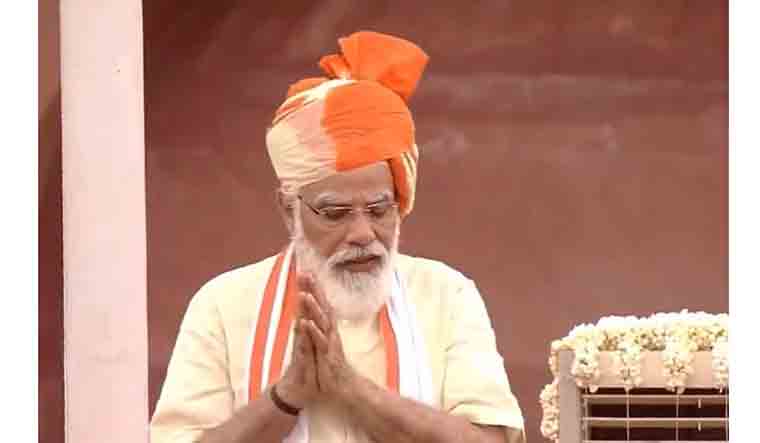In his seventh consecutive Independence Day speech, Prime Minister Narendra Modi gave hope to the people that the country was ready to mass produce COVID-19 vaccine once it got a go-ahead from the scientists on the three candidates under various stages of trial.
With the pandemic casting a shadow over the 74th year celebrations, Modi touched upon the health issues as he announced the National Digital Health Mission, a key scheme to map every citizen's health with a unique ID, and promised to accelerate the Atma Nirbhar (self-reliance) mission his government started, and also stressed on the strong message the country had given to China, Pakistan.
Modi, who became the first longest serving non-Congress prime minister, had many firsts in his speech on Saturday. He talked about the Ram Temple construction—first reference by any PM. He also talked about changing minimum marriage age of girls, and making sanitary pads available at Rs 1 to women; perhaps becoming the first PM to raise the subject, otherwise considered a taboo.
In his nearly 86-minute speech, the prime minister announced bringing out a new national cyber security policy, taking optical fibre network to 6 lakh villages in the next 1,000 days, and bringing in border area strategic management.
In his political messaging, Modi appeared to address the middle class also as he talked about issues dear to them be it health, funds to construct houses, or easing norms of living. For the environment-conscious, he announced new projects to save Asiatic lions and dolphins, while made promising to convert the newly carved out union territory into a carbon neutral region, and starting a special campaign to reduce pollution in 100 selected cities of the country.
Wearing a saffron-yellow turban, with a gamcha (traditional scarf) around his neck as mask, Modi refrained from mingling with the crowds due to social distancing norms, even as school children were not part of the celebrations. PM recounted the work done by his government for the farmers, creating opportunities for greater FDI, reducing imports, ramping up infrastructure with repeated emphasis on creating an Atma Nirbhar Bharat--the phrase most used in his speech.
Strategic message
August 15 speeches are not complete without prime ministers assuring the nation that the country was ready to deal with any misadventures and strategic challenges.
In a message to leaders of south Asian countries, the Prime Minister said that peace will lead to greater prosperity in the region. “Not only those countries with whom we share a border are our neighbours but even those with whom there is a meeting of minds are neighbours,” Modi said in an indication that India is keen on forging ties with all countries in
the region.
But before his call for peace, Modi asserted that India has strongly responded to threats. “Be it terrorism, or expansion, India is fighting these challenges with strength... From LoC to LAC, whoever tried to raise their eyes towards the sovereignty of our country, our soldiers responded to them in the same coin,” PM said in an apparent reference to Pakistan and China. “In Ladakh, the world has witnessed how Indian army has responded.”
As a measure to ramp up strategic infrastructure, Modi said NCC will be expanded in the border areas, and special training will be given to one lakh cadets.
As removal of Article 370 has completed over a year, Modi said India was committed to holding assembly elections in Jammu and Kashmir once delimitation exercise is complete. His statement is likely to send a strong message to the state which will slowly restart political activity. The appointment of a political leader, Manoj Sinha, as Lieutenant Governor, this week last was a pointer to this strategic shift in the Centre's thinking.
Modi talked about bringing a cyber-security policy as the country works online.
Health
The two biggest announcements that came from Modi was assertion that India was ready to mass produce vaccines once it got a go-ahead from the scientists. There is a race across the world to produce the COVID-19 vaccine in which Russia took lead with a claim to have successfully tested a vaccine. All eyes are also on India, as it has the pharmaceutical capabilities to mass produce a vaccine, once a particular drug is approved. Modi's assurance has given hope that India would soon have a vaccine that may be used to inoculate country's large population.
But, the big bang announcement came in the form of launching national digital health mission. This will entail creating a new Aadhar-like health ID which will keep records of every citizen's doctor visits, diseases, the line of treatment and drugs taken. This will also come integrated with facility of using telemedicine, e-pharmacy, creating a nation health registry. The finer points of the scheme may be announced by the health ministry at a later stage, but the issue is likely to generate a huge debate around ensuring privacy of individual health data.
Women empowerment
The prime minister announced from the ramparts of the Red Fort that a panel was looking into the issue of revising minimum marriage limit of girls, which currently stands at 18 years. The expert panel set up in June had largely escaped public attention, but with the PM flagging the issue, it is set to be known across the countries where different communities, regions have their own traditions on marrying girls.
If the marriageable age is revised upwards from 18, it will have a huge societal impact. Thr PM's reference to making available sanitary pads at Rs 1 was aimed at addressing another public health policy issue which is not discussed openly.



